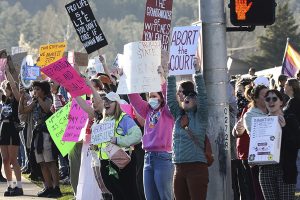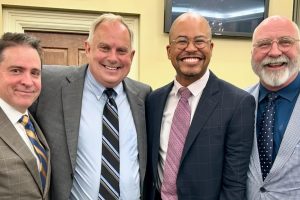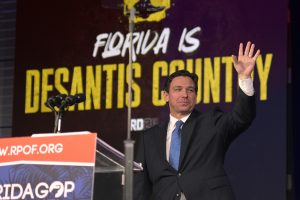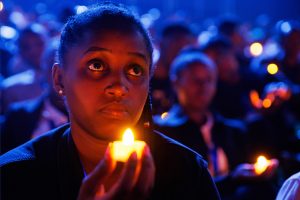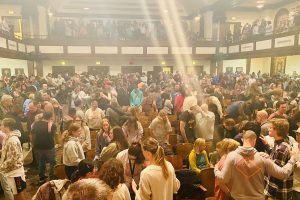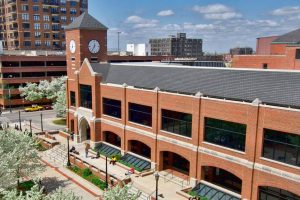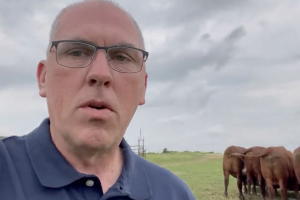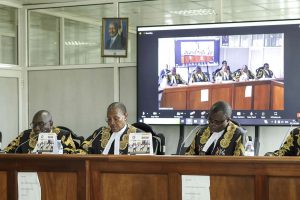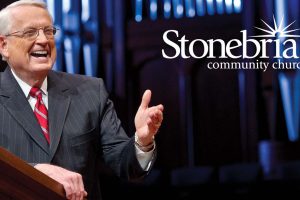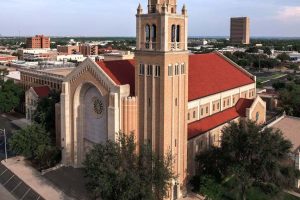The Baptist church of my youth didn’t have a revival until we called a Southern Baptist pastor from Texas. Then we had a revival whether we liked it or not.
I walked the aisle on the final night. At 20 years of age, I never had missed a Sunday worship service. But I had never been “saved.” There had been no Damascus Road conversion. Finally, I quit waiting. I loved God and wanted to live like Jesus, so, at the conclusion of an incoherent and bewildering sermon, I presented myself as a candidate for baptism.
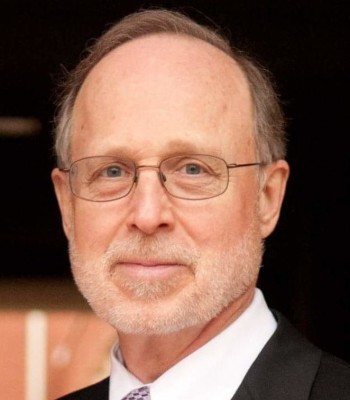
Alan Bean
When my parents were swept up in the charismatic renewal of the 1970s, they wanted me to experience the baptism of the Holy Spirit “with signs following.” I smiled awkwardly. Revivalism, whether of the Baptist or the Pentecostal kind, never has worked for me.
And yet, when I heard that revival had broken out at Asbury University in Wilmore, Ky., I experienced a rare rush of hope. This sounded legit. Nobody was calling on sinners to accept Jesus as their personal Lord and Savior. Celebrity preachers and musicians weren’t involved. Instead, young people, most of them of tender years, were standing, kneeling, bouncing and lying prostrate at the altar. They lost all sense of time. They wept tears of joy.
“I am thrilled that thousands of other people have experienced the love of God in a profound way.”
If you placed me in Hughes Chapel, I wouldn’t be comfortable. In the immortal words of Austin Powers, “It’s not my jam, baby.” Nonetheless, I am thrilled that thousands of other people have experienced the love of God in a profound way.
Woodstock
When I heard about Asbury, I immediately thought of Woodstock, the iconic lovefest of August 1969. Since Woodstock is often associated with drugs, sex and rock and roll, this might seem an odd comparison. The analogy can be pushed too far. But for many young people back in the day, Woodstock was a religious experience.
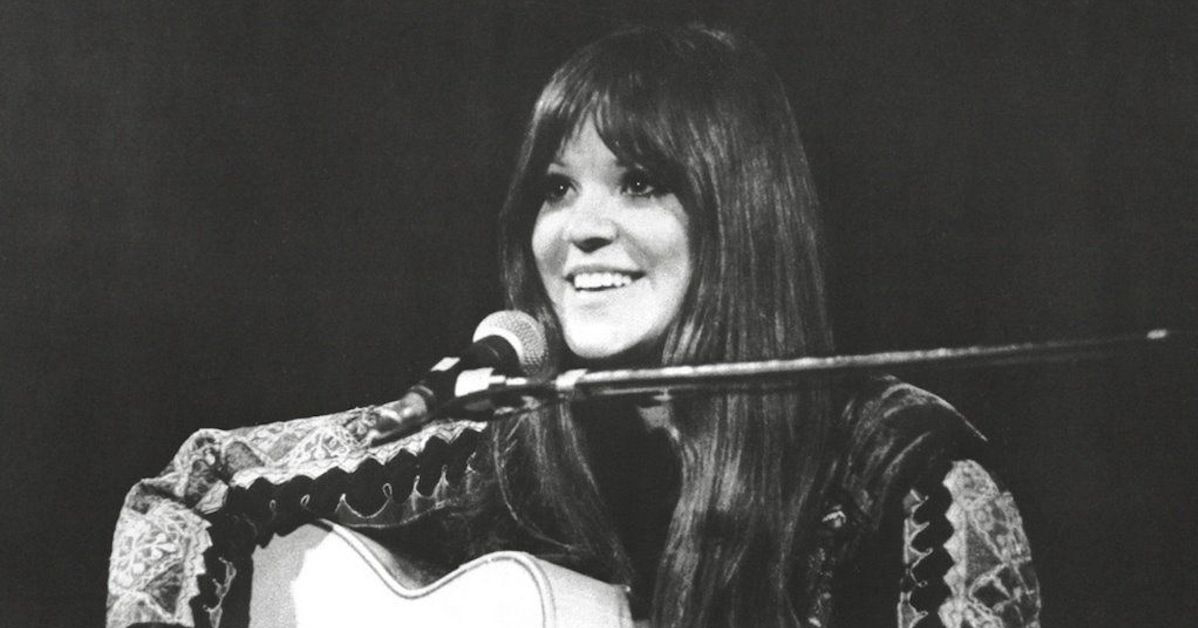
Melanie at Woodstock
“I didn’t hear a thing,” the folk singer Melanie remembers of her Woodstock performance. “I wasn’t there and was hovering above my body and at some moment felt one with myself again.”
When Melanie released “Candles in the Rain” (a song about Woodstock), it was fitting that she asked a Black gospel group famous for their rendition of “O Happy Day” to sing backup.
“We were so close,” Melanie remembers, “there was no room, we bled inside each other’s wounds. We all had caught the same disease, and we all sang the songs of peace. Some came to sing, some came to pray, some came to keep the dark away.”
I bet the young people touched by the Asbury revival can resonate.
Joni Mitchell’s song “Woodstock” was equally aglow with religious fervor. “We are stardust, we are golden, we are caught in the devil’s bargain, and we’ve got to get ourselves back to the garden.”

View, along an unidentified road, of both vehicle and pedestrian traffic on the way to the Woodstock Music Festival, New York, August 13, 1969. (Photo by Owen Franken/Corbis via Getty Images)
Mitchell deeply regretted missing Woodstock. “I really, really felt sorry for myself,” she told an audience in 1969, “because it’ll never happen again. They’ll try and recapture it, you know, and it’ll just get worse and worse and worse.”
To everything a season
There couldn’t be another Woodstock because there couldn’t be another August 1969. Just two years after the Summer of Love, fault lines were appearing all over America.
The assassinations of Martin Luther King Jr. and Robert Kennedy were still fresh wounds.
In Vietnam, the controversial Tet Offensive had been killing thousands on all sides of the conflict.
The Democratic Convention, held a year before Woodstock, had descended into chaos as anti-war protesters were brutalized by club-wielding police officers.

Original Broadway cast of “Hair”
Hair, a musical celebrating “the dawning of the Age of Aquarius” had opened on Broadway two years prior to a mix of outrage and adulation.
The Rolling Stones didn’t play Woodstock, but their “Gimme Shelter” reflected the apocalyptic spirit of the time: “Ooh, a storm is threatening my very life today, if I don’t get no shelter, ooh, I’m gonna fade away. War, children, it’s just a shot away.”
Woodstock was far more than a music festival with an unusual number of big acts. The half million kids flocking to Max Yasgur’s farm in August 1969 were a traumatized generation seeking shelter from the storm.
Karen Breda, a nursing professor who attended Woodstock as a young woman, says she came for the music but discovered something far more important. Woodstock “seemed to transcend the anger that clearly a lot of people were feeling,” she says. “It was about being together. It was about helping out someone that needed something.”
Woodstock, N.Y., and Asbury, Ky., mark the extreme liberal and conservative poles of American society. Yet Asbury’s big revival of 1970 helped fuel a Jesus Movement that addressed the same sense of fear and longing that drew young people to Woodstock.
Revive us again
The Asbury revival of 2023 unfolded against a cultural backdrop every bit as bleak as the summer of 1969. There were the long months of enforced isolation that came with the COVID pandemic. The culture war was verging on civil war. White American evangelicals were falling in love with the most corrupt president in history. Russia was brutalizing the people of Ukraine. American police officers were regularly brutalizing defenseless citizens. Mass shootings were re-traumatizing the nation on a daily basis.
Holiness theology, the religious tradition that has been the heart and soul of Asbury from the start, is rooted in the teaching of John Wesley, the founder of Methodism. Wesley was pushing back against a bleak Calvinism that compared the “total depravity” and moral incapacity of a fallen humanity to the sovereign power and moral perfection of God.
Wesley argued that Jesus’ call to “be perfect as your heavenly father is perfect” was senselessly cruel if “entire sanctification” was beyond our grasp. The “sanctified” believer might commit errors of fact and judgment, Wesley allowed, but the soul would remain entirely captive to the love of God.
Wesley taught that entire sanctification is the gift of a gracious God, a blessing beyond the reach of human striving. But for Wesley, sanctification shouldn’t be a gradual or evolutionary process; it was a miraculous, often instantaneous, work of God.
Recent exclusions
But a tradition dedicated to living like the angels is bound to have trouble with human sexuality.
Asbury’s Statement on Human Sexuality defines “the sin of sexual immorality” as “premarital sexual behavior, adultery for the heterosexually married person, polygamy, polyandry, pornography, incest, and all forms of same-sex practice.” It’s OK to be gay, Asbury believes, so long as you remain celibate.
“For decades, Asbury University (and the seminary across the road) have been inching ever closer to the ruthlessness rigidity of conservative evangelical orthodoxy.”
For decades, Asbury University (and the seminary across the road) have been inching ever closer to the ruthless rigidity of conservative evangelical orthodoxy. Three years before the Asbury revival, the administration refused to renew the contracts of two professors, Jon Roller (worship arts) and Jill Campbell (music education). Roller and Campbell are straight; their great sin was offering aid and comfort to Asbury’s beleaguered LBGTQ community.
The firing of Roller and Campbell immediately heightened the ideological divide within the student body. A letter to the student paper identified the fear lurking behind the administration’s decision: “If these two are nice to gay people, everyone on campus might start being nice to gay people, and then what?”
The answer is painfully simple. If Asbury University earned a reputation for loving and accepting gay students, the school would immediately be drummed out of the white American evangelical community. And anybody with any sense knows it.
Several months after Roller and Campbell were fired, two dozen Asbury students staged a walk-out to protest the school’s treatment of LGBTQ students, challenging the administration to “provide gender/sexuality training for staff and faculty” and to “eliminate discrimination of staff and faculty based on affirming views of sexuality.”
“I am a Christian, and I am gay,” one of the protesting students declared. “And your loveless theology cannot take that away.”
Although most Asbury students hail from conservative homes and churches, social media has introduced their generation to the bewildering complexity of social issues, especially those involving race and sex. Asbury students realize white evangelical community is commonly lumped in with gun-toting militia movements, QAnon conspiracy theorists and the thinly disguised racism, antisemitism and casual misogyny of the MAGA movement. Some students are OK with that. Others are conflicted. A significant minority is horrified.
Homogenization
Asbury University and Asbury Seminary have long been at the forefront of a sustained conservative critique of the United Methodist Church. Largely due to pressure from the denomination’s conservative wing, the official United Methodist response to gay Christians has been decidedly conservative. According to the church’s Book of Discipline, gay men and women are “persons of sacred worth,” but “same-sex relations” are “incompatible with Christian teaching.”
“White American evangelicalism may be a crazy quilt of diverse traditions, but the need to present a common front to a hostile world has had a homogenizing effect.”
A white American conservative monolith has been taking shape for decades. White American evangelicalism may be a crazy quilt of diverse traditions, but the need to present a common front to a hostile world has had a homogenizing effect.
As the lines between the ecclesiastical and the political blur, Holiness Methodists are losing their distinctiveness. The moderate minority within the Holiness tradition must be asking, with W.B. Yeats, “What rough beast, its hour come round at last, slouches towards Bethlehem to be born?”
“I know this campus very well,” Alison Perfater, Asbury’s student body president explained to a documentarian. “And I know exactly which students on this campus hate each other. And those are the people I have seen praying together, singing together, hugging, crying. I myself have had a list of least favorite people at this school, and I have spent the week with them, and it’s been totally life changing.”
Critics on the watch
Not everyone was rejoicing, however. Progressive Christians greeted the Asbury outpouring with a skepticism bordering on hostility, and it wasn’t long before fundamentalist observers, scouring Twitter for signs of apostacy, found the motherlode.
“Lots of people repenting of homophobia and transphobia,” one student tweeted happily. “Did you know people of color, women and queer students have been leading worship all eight days?” another exulted.
“I guess it took until the Asbury outpouring,” a gay Asbury Seminary student tweeted nine days into the revival, “for some people to realize that gay people are in their churches, their pews, their choirs, their worship teams, their prayer groups, their youth groups, their seminaries and all that. And they’re worthy of love. And dignity. And care.”
A week into the revival, the same student reported that “right-wing protesters” had been seen “screaming at worshipers” and that “one man with an awful homophobic shirt on was removed from Hughes Auditorium.”
Jill Campbell, one of the Asbury professors fired for defending gay students, was coping with a sudden deluge of interview requests. What did she think of the Asbury revival? Would she be attending?
“The place so many are referencing and inviting me to this week is impossible for me to go back to,” Campbell stated in a Facebook post. “God has helped me through the enormous pain, grief and trauma of what I experienced there, and I do NOT have to ever step foot back in a place that literally broke my heart, a place that rejected many humans, and a place that has never reached out to me to apologize. If ever such a dialogue would come, you would think it would come during this time, but it has not, and I assume it will never come.”
Closing ranks
Asbury students, faculty and administration closed ranks against anyone from the outside world seeking to exploit or denigrate “the outpouring” (as it was now being called). Christian nationalists appeared in Hughes Chapel blowing shofars; they were immediately silenced. When celebrity preachers and A-list CCM performers offered to strut their stuff for free, they were ushered to a seat and invited to worship with the common folk. Even Tucker Carlson, the self-styled savior of Christian America, was politely rebuffed when he announced plans to visit Wilmore.
In the first three days of the outpouring, before outsiders began clogging the streets of tiny Wilmore, the students had Hughes Chapel to themselves.
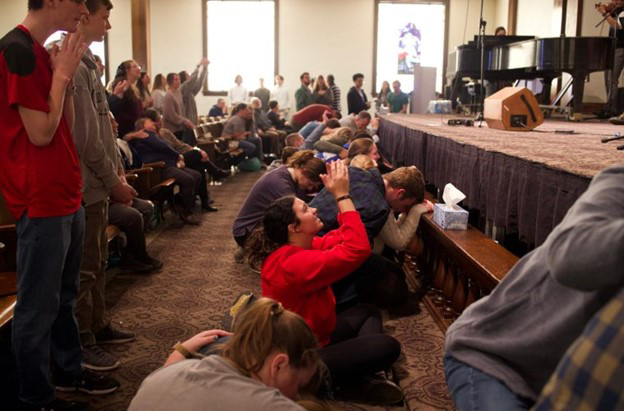
Students kneeling in the chapel at Asbury University during the outpouring.
“There were so many redeemed relationships,” Alison Perfater told a reporter, “praying over each other and a lot of healing from COVID trauma. … We had that chance to fill up ourselves and each other. Then we kind of became like a church that weekend, and now we’ve become a mission field.”
Asbury’s revival didn’t resolve the institution’s intermural culture war but, for a few glorious days, thousands of hurting people were lifted above the noise of battle.
The spark
Zach Meerkreebs, a Lexington pastor and volunteer soccer coach at Asbury, addressed the Asbury community moments before the outpouring began. According to a host of social media memes, God used a lackluster chapel sermon to ignite revival. Message: God can use anybody. Meerkreebs’ sermon was far from eloquent, but his passion, sincerity and intensity were remarkable and proved to be infectious.
“Stop striving,” the young pastor told the students. Until they were embraced by the love of God, he said, their efforts at self-improvement would fall flat. “I can’t forgive my enemies, I can’t forgive my dad who abused me, except if I’m loved by Jesus. I can’t forgive those churches that did me wrong until I am experiencing the love of Jesus.”
Boom! Religious trauma and incest were on the table.
“Meerkreebs modeled the ‘radical humility’ and brutal honesty that characterized the Asbury revival.”
Meerkreebs modeled the “radical humility” and brutal honesty that characterized the Asbury revival. Following his example, students found the courage to stand before their peers and speak frankly about their homophobia, their racism, their addiction to porn, their suicidal ideation, their depression, their spiritual trauma, and their hatred. And suddenly they found themselves immersed in the deep, deep love of Jesus, which is exactly what John Wesley had in mind.
It is entirely possible that neither Woodstock nor Asbury were capable of lighting my fire. So what? It doesn’t always have to be about me, or about you. God can work through a rock concert or a religious revival.
Like Woodstock, what happened at Asbury was a singular and unrepeatable event, tailor-made for a particular people at a particular time. God bless them, every one.
Alan Bean is executive director of Friends of Justice, an alliance of community members that advocates for criminal justice reform. He lives in Arlington, Texas.
Related articles:
Asbury University closes down revival that clogged small Kentucky town
Questions to ask while pondering if Asbury is hosting a ‘true revival’ | Analysis by Rick Pidcock
We’re asking the wrong questions about the Asbury revival | Opinion by Andrew Garnett
About the Asbury ‘revival’: Time will tell | Opinion by Mark Wingfield
What I witnessed this week at the Asbury revival | Analysis by Laura Levens
‘Something wonderful and of God is happening at Asbury,’ church historian believes | Analysis by Joseph Early



















